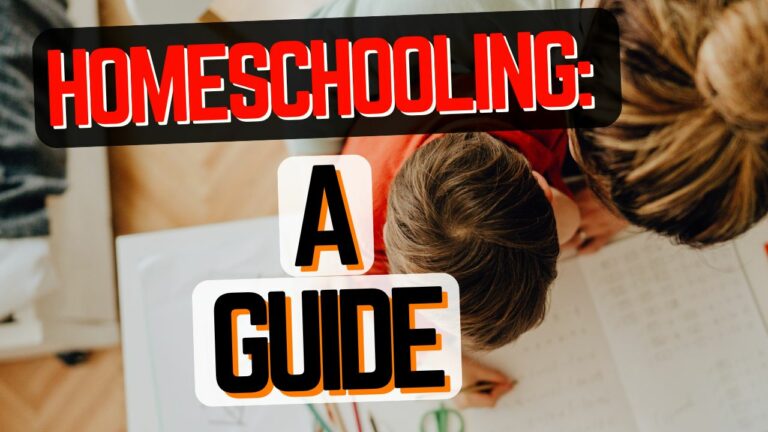What is homeschooling? Is it school-at-home, or is it more than that? If you’re asking these questions, you’re not alone, as the definition is murky due to the many methods with which a child can be educated at home. While many homeschool parents employ the traditional method that mimics the public school setup, others use a more flexible and natural way of learning.
Homeschooling, which is also called schooling from home or home education, is increasing in popularity today, with an estimated 5 million homeschoolers in the United States alone.

I hope you enjoy reading this blog post. If you want to do my course on how to homeschool, click here.
Homeschooling in Australia has also experienced an unprecedented annual increase in 2022 of at least 20%, making it the fastest-growing educational movement today.
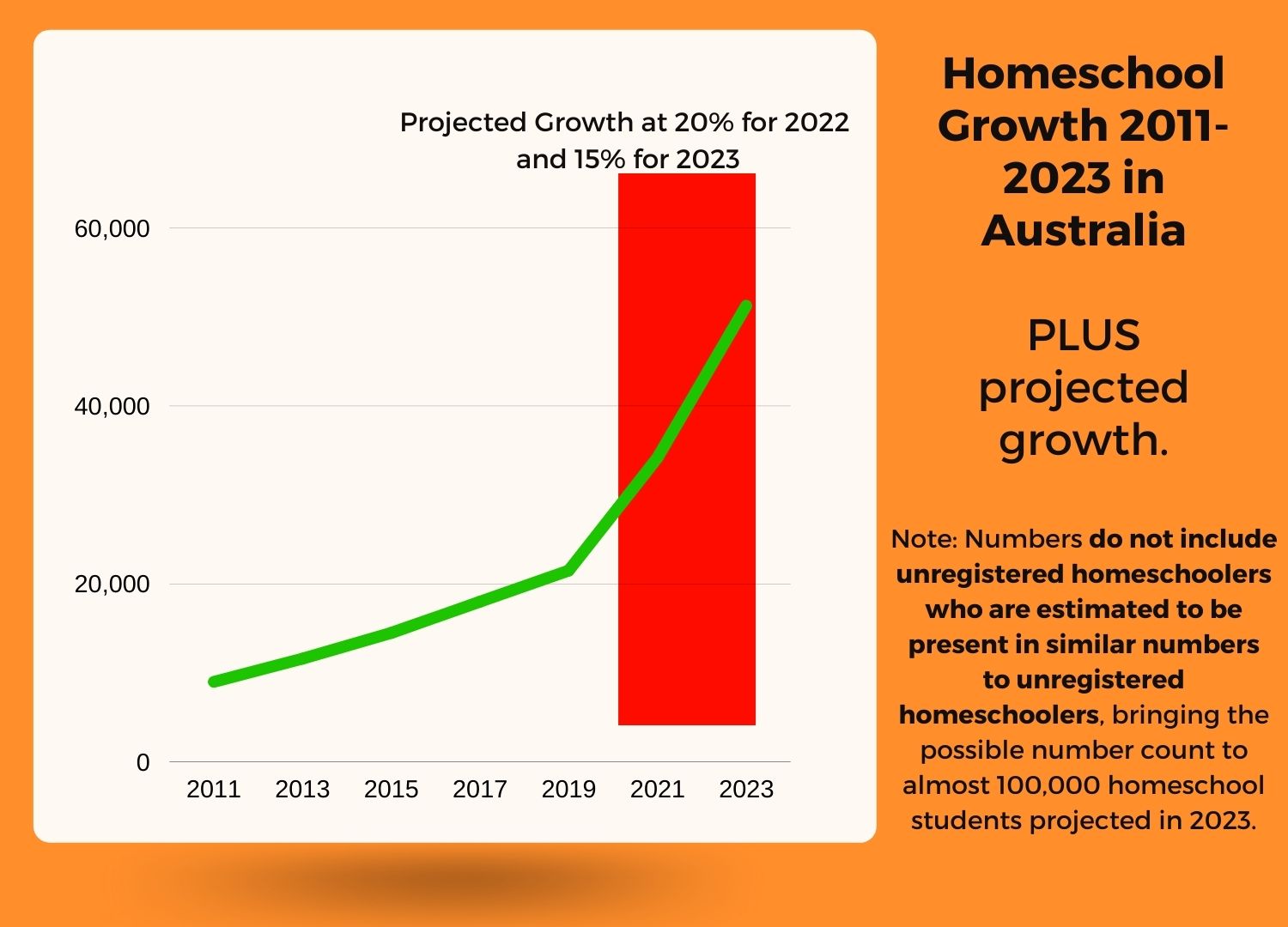
There are affiliate links in this article. This allows me to earn an income for my family.
What is Homeschooling
Homeschooling is the education of children inside the home.
This education is usually done by parents (90% of mothers) and more rarely by fathers or tutors.
My parents taught me using books they bought from a warehouse that sold curricula that could be used inside or outside a school.
This continued until high school, when they changed our curriculum to distance education (not technically homeschooling).
We were then tutored by phone teachers and sent books and other educational materials.
Unique Benefits of Homeschooling
Parents are increasingly finding that homeschooling offers an array of unique benefits for their children.
From increased flexibility to personalized learning, homeschooling can be a great option for families seeking alternative education options.
One of the major advantages of homeschooling is that parents have control over their child’s curriculum.
This means they can tailor lessons to suit their child’s needs and interests, giving them a leg up on traditional classrooms with little room for customization.
Additionally, since children typically learn at different paces parents can use a curriculum that goes at their pace.
Using mastery-based or self-paced curriculum means parents can provide instruction based on each student’s needs and preferences more easily than in a traditional classroom setting.
The Home-Based Learning Revolution
The home-based learning revolution is sweeping the world as parents and educators are increasingly recognizing the benefits of empowering children to learn in their own living room.
With advances in technology, it is now easier than ever for children to access a wide variety of educational materials right at home.
For example, online homeschool curriculum options abound!
This new education model gives parents more control over what their children learn.
Parents can also tailor the curriculum to match their child’s individual skills and interests.
Furthermore, students can develop valuable self-discipline through self-directed study and get plenty of one-on-one support from dedicated online teachers or tutors.
The flexible schedule also helps keep everyone on track without sacrificing family time or extracurricular activities.
For anyone considering this shift towards home-based learning, there are many resources available that can help ensure success.
If you’re considering homeschooling you can start with the Homeschool Parenting Program (an online course on how to homeschool) or get the free resource, The Ultimate Guide on How to Start Homeschooling on the homepage.
Flexibility in a Homeschool
Having a flexible routine is a key aspect of homeschooling.
For many families, the ability to adjust their curriculum and instruction in response to their children’s needs is a major factor in choosing to homeschool.
Flexibility allows parents to customize their child’s educational experience, which can be especially beneficial for students who may not thrive in traditional school settings due to learning differences or other circumstances.
Having flexibility when it comes to homeschooling can result in better outcomes for children, both academically and emotionally.
Parents can set more realistic goals based on what works best for their students rather than trying an approach that could potentially create frustration or confusion for them.
Furthermore, with the freedom of adjusting the pace and content of lessons, students can focus on topics that interest them most while still meeting all necessary academic requirements.
Different Ways to Homeschool
Homeschooling looks different in each family.
Homeschools vary tremendously because a child’s curriculum and family routine are determined by the caregiver (usually parents).
Traditional schools follow a similar operation pattern (children arrive, they do their paper curriculum, morning tea and some PE are included, and so on).
Homeschools are radical, and it’s hard to pin down general operations.
They can use various homeschool methods to help accomplish educational goals.
The most popular ones are the:
- traditional method,
- Charlotte Mason, and
- Classical education
- eclectic, and
- unit studies methods
There are also the less popular homeschool approaches:
- unschooling,
- Waldorf, and
- Montessori.
Parents usually choose a method based on what works well for parents (as teachers) and the individual children themselves.
History of Homeschool in Modern Times
The modern-day homeschool movement has been increasing since the 1970s when Dorothy and Raymond Moore (Christian home educators) and John Holt (founder of the unschooling method) suggested schools needed to be reformed.
Education at home was proposed, and the movement has steadily increased.
This increase parallels the slow ousting of Christian values and beliefs in public schools, forcing parents to choose a Christian education – especially if they couldn’t afford the cost of private schooling.
COVID has also brought about an unprecedented interest in homeschooling, with homeschooling in Australia growing at least 20% last year alone.
America has also seen an unprecedented spike in homeschool numbers.
Legal Requirements of Homeschooling
Homeschooling is legal in Australia, the United States, the UK, and most other countries.
Each state imposes homeschool regulations.
These regulations can be onerous (in high-regulation states) or relatively easy (in no or low-regulation states).
The HSLDA is an organization where parents can quickly look up homeschool laws in their state.
Regulations can include regulating:
- submitting a notice of intent to homeschool,
- submitting an individualized home instruction plan,
- complying with homeschool hours,
- the curriculum chosen,
- standardized testing showing homeschool test scores,
- parental qualifications, or
- quarterly reports.
Most states don’t require this level of regulation, but some, like New York, are pretty strict.
How to Start Homeschooling
You can start homeschooling by learning about the homeschool method that will suit you and then picking the right curriculum to match.
You can look at the homeschool methods and see matching curricula at the bottom of this page.
Or, if you want a shortcut, you can do my free homeschool quiz, which will figure that out for you!
For more information on how to homeschool, check out this article.
Homeschool Schedule vs. a Homeschool Routine
Some parents believe a homeschool schedule (something that accounts for hourly events throughout the day) is a must-have.
But I’ve seen these burn parents out.
Instead, consider having a relaxed homeschool routine without time slots for specific subjects.
Homeschooling gives you lots of flexibility, so you don’t need to follow a rigid schedule. So, take advantage of that and let homeschool work around you!
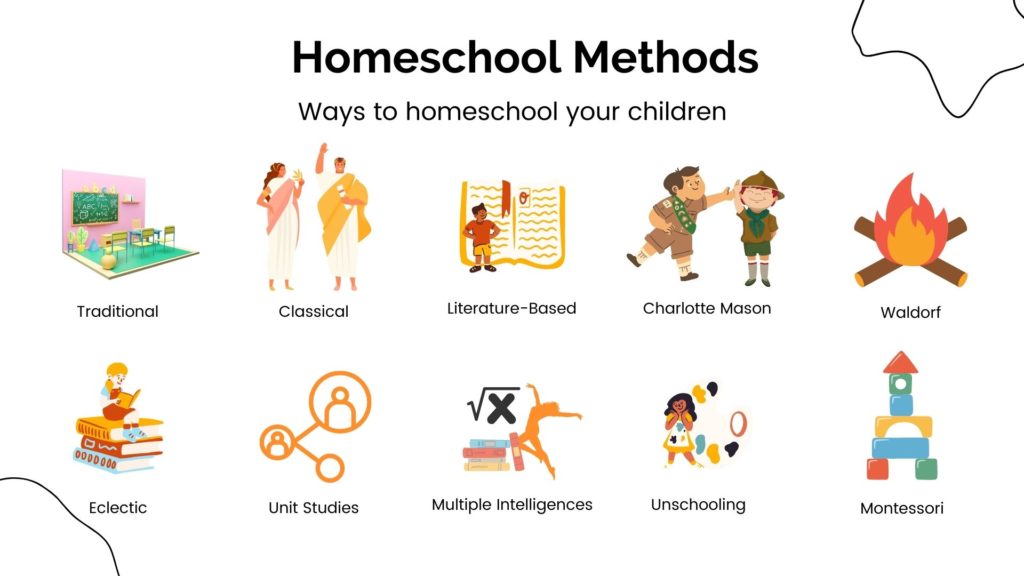
Is There a Difference Between Homeschoolers and Home Educators?
If you’ve read many articles about homeschooling or home education, you may have wondered if there is a difference between the terms.
It seems there is no difference in most countries, and the words are used interchangeably by many people.
However, some parents who home educate don’t like the term ‘homeschool’ as they feel it sounds too much like the traditional education method – that is, the method public schools and most other schools use.
Some don’t like the term because they’re anti-establishment types or believe children can learn much better at home because it differs from the school environment.
The term is also used in different volumes depending on what continent you live on.
In the United States, most people use ‘homeschooling’.
In the UK, Europe, Australia, and many Commonwealth countries, people use the term ‘home education’.
Note on the Definition of Homeschooling in the UK
In the UK, ‘homeschooling’ refers to schooling your child (through virtual, online, or distance education) at home.
In contrast, ‘home education’ refers to people who deregister their children from school and take responsibility for their children’s education.
Different Conceptions of Homeschooling
To confuse things, homeschooling is referred to in many different contexts. ‘
Consider the graphic below:
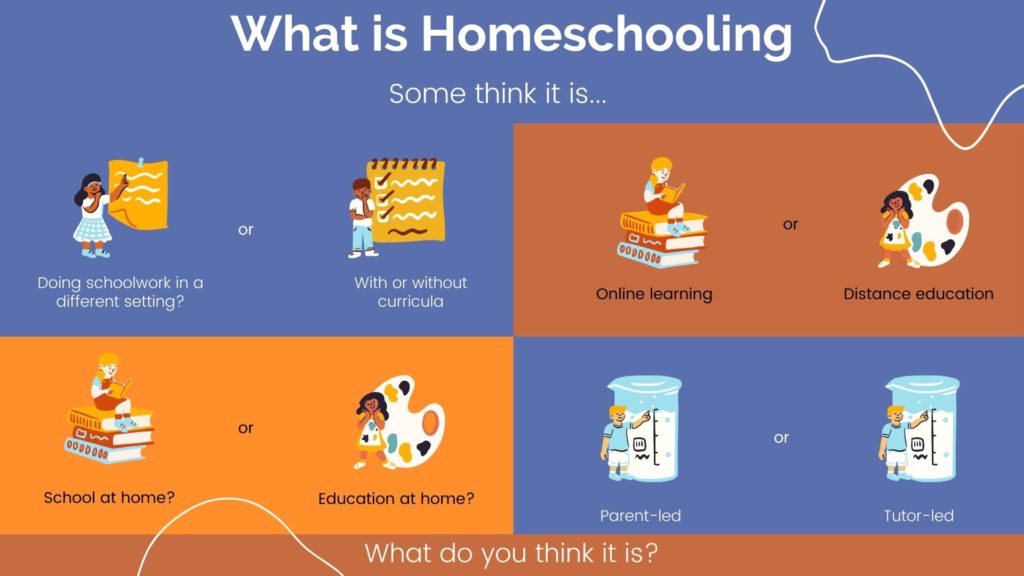
Curriculum Choices
There are hundreds of curriculum packages out there that aim to give you what you’re looking for.
When choosing a curriculum it’s useful to have a Curriculum Finder or Curriculum Guide to help narrow the search.
I use the BJU Press and Schoolhouse Teachers curriculum packages.
I choose the necessary (and the fun) parts from the programs and leave the rest of the material!
This is called an eclectic way of homeschooling.
Homeschool is a Popular Choice Today
It’s helpful to realize homeschooling is pretty popular these days.
The terms ‘what is homeschooling‘ and ‘homeschooling definition‘ are googled almost 2,000 times a month in the United States alone.
Perhaps this is a reflection of the growing popularity of homeschooling.
Specifically, the term:
- ‘Homeschooling’ is google 73,000 times a month in America,
- ‘What is homeschooling’ is googled 1,000 times a month, and
- ‘Homeschooling definition’ is googled 880 times a month.
Interesting, huh?
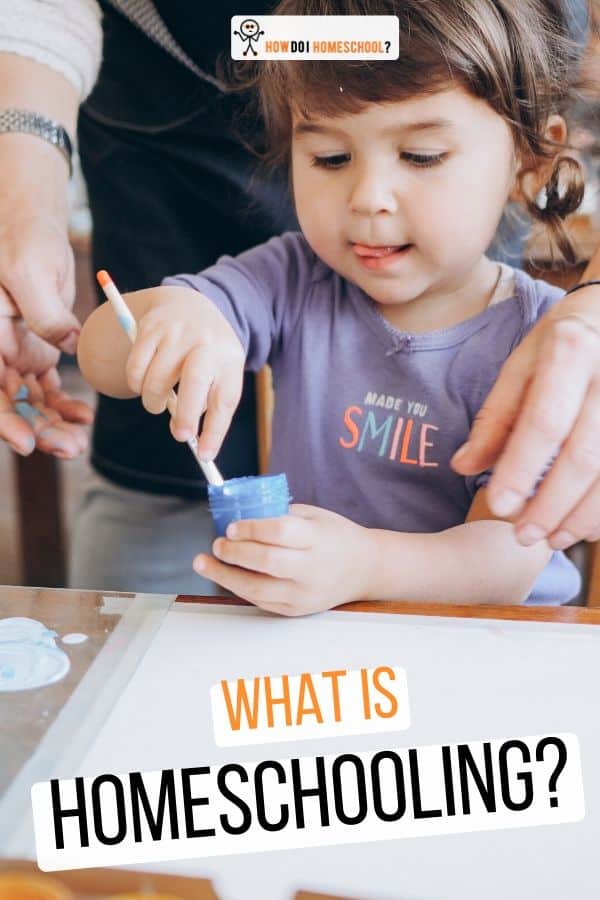
Various Homeschool Curriculum Options
With the rise in homeschoolers, there has been a corresponding increase in the variety of homeschool curriculum choices available to parents.
From comprehensive programs to highly individualized options, homeschoolers today have more resources than ever before.
Let’s go through some choices that are available today below:
- Boxed homeschool curricula – these programs are entirely offline and get sent to you in the mail. They have been around longer than online curricula, and many companies produce them, such as BJU Press and Abeka.
- Online homeschool curricula – these programs can come as partially online in that you get workbooks delivered to your door, and children can interact online with teachers through pre-recorded videos or live videos. Some programs are accredited, which actually means you’re studying with an online school.
- Self-paced homeschool curricula – these programs are mastery-based curricula which are designed to let children completely master the topic through self-paced learning before they move on to the next topic. This is contrasted to spiral learning which is more often used in a classroom situation.
You can also choose according to the homeschooling method you like best.
Two popular options are classical and Charlotte Mason curricula.
Homeschool Socialization?
One of the most common misconceptions about homeschooling is that it can lead to social isolation due to a lack of socialization opportunities.
This is not usually true, and in reality, there are a variety of ways that homeschoolers can actively engage in social activities and foster healthy relationships with other students and members of their local community.
Opportunites for socialization include:
- virtual classrooms
- online learning platforms
- field trips,
- extracurricular activities,
- sports teams, and
- volunteer opportunities
Homeschoolers can access various resources that promote interactions with peers from diverse backgrounds.
In addition to these options, homeschoolers are encouraged to participate in organized meetups (like groups or homeschool co-ops) or forums.
Here they can join groups for like-minded individuals or those who share similar interests.
You can learn more about homeschool socialization here.
Questions to Ask Before You Start Homeschooling
First, ask yourself if you have the time and resources to commit to homeschooling.
Depending on your chosen curriculum, you may be responsible for creating lesson plans, grading tests, and organizing field trips or other activities that contribute to your child’s education—all while providing emotional support and motivation.
If you don’t have lots of time to spare (for example, you’re working from home while homeschooling) make sure you get a program that children can do independently, like Easy Peasy or Lifepac.
Additionally, are there any laws in your state governing homeschooling?
While most states allow parents to teach their children at home, some require registration with local school districts or periodic assessments of student progress by certified teachers or other skilled professionals.
Finally, consider whether all of the members of your family are committed to making homeschooling work.
The most successful homeschooling experiences involve everyone (particularly a partner) being on board and understanding their role in the process.
Want to Learn How to Homeschool?
There are two great ways t learn more about homeschooling: one is free, and one is a $67 fundamentals course.
The $67 Course
Looking to take your homeschooling to the next level?
Join Rebecca Devitt’s online Homeschool Parenting Program and learn the strategies and techniques needed to make homeschooling a success!
Enrol in the HPP here.
The FREE Youtube Channel
Also, make sure you join the How to Homeschool Youtube channel, which will give you a fun and exciting look into the homeschool world and help homeschool your children. Check out the channel here, and don’t forget to SUBSCRIBE.
If you’re not sure where to start, start with the following playlists:
- Starting homeschool playlist
- Homeschool Methods playlist
- Homeschool Curriculum playlist
- FAQs on Homeschooling playlist
You’ll love it and find it helpful and entertaining! Discover the channel here.
Learn the ‘Why’ of Homeschooling
Learn why homeschooling is an amazing option for your family. Homeschooling offers so many benefits…and you’re probably only familiar with the tip of the iceberg. The book Why on Earth Homeschool shows you the reasons why homeschooling is the best choice for your family. Discover the book here.
Conclusion
Homeschooling is a great option to consider if you’re looking into the best way to educate your children. This mode of education offers families a more diverse way of teaching children concepts and allows children to learn using their curiosity, which is the best way to learn. If you’d like to learn more about homeschooling, head to our informational page.
